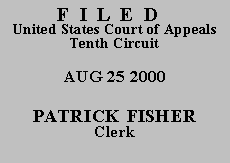

| JIMMY DAVID HARDEN,
vs.
RITA MAXWELL; ATTORNEY
GENERAL OF THE STATE OF
OKLAHOMA |
|
Mr. Harden alleges that a review of the appellate record sent by the trial court to the OCCA reveals that the jury instructions were never included. He includes a page from the trial transcript at which time the judge read the instructions to the jury. The transcript merely states: "(The Instructions were read to the jury by the Court as filed in this case."). Mr. Harden relies heavily upon Okla. Stat. Ann. tit. 20, § 106.4 (West 1991) (describing the duties of court reporters) in arguing that this failure to include the instructions in the appellate record deprived him of due process. That section states in relevant part:
A refusal of the court to permit or to require any statement to be taken down by the court reporter or transcribed after being taken down, upon the same being shown by affidavit or other direct and competent evidence, to the Supreme Court, or other appellate court, shall constitute a denial of due process of law.
Id.
To the extent Mr. Harden's claim relies upon state law, it is not a proper subject for federal habeas review and we do not address it. See Montez v. McKinna, 208 F.3d 862, 865 (10th Cir. 2000) ("[C]laims of state law violations are not cognizable in a federal habeas action."). Our review under the United States Constitution, however, convinces us that no federal due process violation occurred. As the Eighth Circuit has convincingly noted, the "[m]ere absence of a perfect transcript does not necessarily deny one due process of law." Mitchell v. Wyrick, 698 F.2d 940, 941 (8th Cir. 1983) (collecting cases). Rather, the petitioner must allege some prejudice resulting from the failure to supply a complete record on appeal. Id. at 942; see also Saathoff v. Hesse, No. 95-1130, 1995 WL 749722, at **2 (10th Cir. Dec. 19, 1995) (unpublished order and judgment) (applying prejudice requirement); Ortiz-Salas v. INS, 992 F.2d 105, 106 (7th Cir. 1993) (requiring petitioner "to make the best feasible showing he can that a complete and accurate transcript would have changed the outcome of the case"); White v. Florida Dep't of Corrections, 939 F.2d 912, 914 (11th Cir. 1991) (requiring showing of prejudice); Bransford v. Brown, 806 F.2d 83, 86 (6th Cir. 1986) (same).
Mr. Harden has not presented this court with any evidence that his direct appeal was prejudiced in any manner by the failure to include the jury instructions. He admits that "[i]t is impossible to argue at this late date whether or not these instructions indicate errors of law due to their unavailability. The defendant was simply deprived of the opportunity to have the instructions reviewed by the appellate court." Aplt Br. at 6. While we sympathize with Mr. Harden, his mere speculation as to possible error is insufficient to raise any indication of prejudice, particularly given the fact that prisoners do not have a constitutional right to a complete copy of the trial record on appeal. See Draper v. Washington, 372 U.S. 487, 496 (1963) (noting that a state-provided record may "be limited to the portions relevant to such issues" raised on appeal).
We DENY a certificate of appealability and DISMISS the appeal.
Entered for the Court
Paul J. Kelly, Jr.
Circuit Judge
*. This order and judgment is not binding precedent, except under the doctrines of law of the case, res judicata, and collateral estoppel. This court generally disfavors the citation of orders and judgments; nevertheless, an order and judgment may be cited under the terms and conditions of 10th Cir. R. 36.3.
**. After examining the briefs and the appellate record, this three-judge panel has determined unanimously that oral argument would not be of material assistance in the determination of this appeal. See Fed. R. App. P. 34(a); 10th Cir. R. 34.1 (G). The cause is therefore ordered submitted without oral argument.